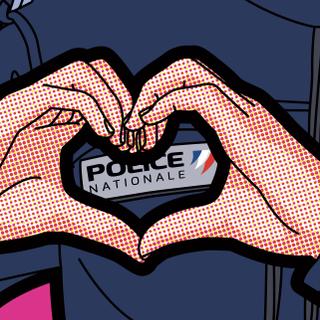


The young French people who dream of becoming police officers
FeatureLe Monde observed the oral exams for the police entrance examination. Young men and women, overwhelmingly from working-class backgrounds and in search of 'useful' jobs, had to explain their backgrounds and motivations.
Victor R., 27, attempted to pass his high school exams twice but failed both times. "I was never very scholarly," explained the young man wearing a blue suit and tie and sporting a thin mustache. "I went back to school and got access to a university studies degree to get the equivalent of a baccalauréat." His one clear motivation: to become a law enforcement officer. "I've always been attracted to the police because of the security aspect of the job, being ready to act to protect French values, republican values," he said one late December day on the seventh floor of a nondescript building in the Paris suburbs where the oral exams to join the French police were taking place.
Here and in the seven other locations in France is where the Interior Ministry recruits its newest police officers, aged between 17 and 45: Over 7,000 in total by 2023, including 4,200 field agents, were recruited at the high school diploma level via external or internal competitive exams. These civil servants will be paid from €2,100 net per month at the start of their career to €3,600 at its end. In Noisy-le-Grand, a suburb of Paris, and Tours, in the Loire Valley, Le Monde attended the December and January oral examinations, as is authorized by law, without candidates being informed, to avoid disturbing them.
In front of Victor R. were three jury members: a divisional commanding officer, a major at the end of his career, and a police psychologist. The young man had passed the first two stages of the selection process: written tests (case studies and multiple-choice questions on general knowledge and English) and physical tests (endurance and physical skills course). The 25-minute oral exam is meant to enable the jury to ascertain the candidate's motivation. "We assess their ability to work in a team, to reason, to learn quick-mindedness and responsiveness," listed Carole Cornali, the commanding officer and jury president. "This allows us to look at their anxiety and interpersonal skills," added Hervé Brisson, a major in the Paris suburbs for over 30 years. Victor R. ended his interview with them with a promise: "I'm highly motivated. If I don't pass this time, I'll be back in six months to retake the exam."
Not everyone hates the police, even if this slogan is often used in demonstrations by other, usually more highly educated, urban youth. Those standing in front of the juries are young men and women attracted by the civil service and the promise of having a "meaningful" job. Many come from working-class backgrounds, with a high school diploma and sometimes a bachelor's degree, but more often than not, no higher education qualifications despite spending one or two years at a university. Many have already held a job to make a living.
You have 90% of this article left to read. The rest is for subscribers only.
